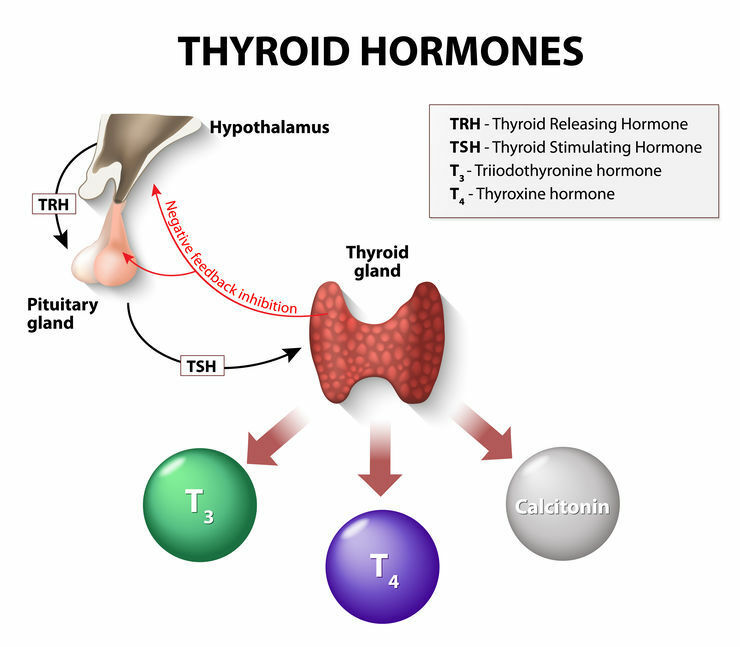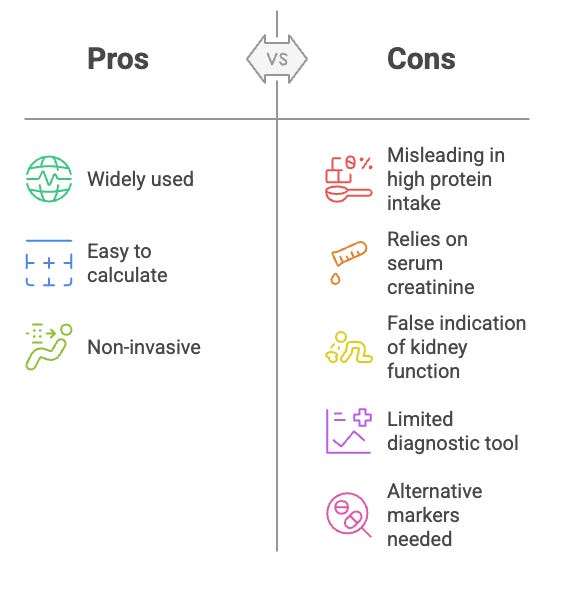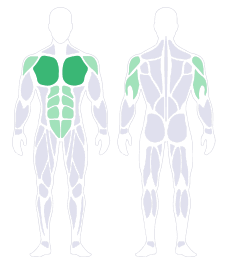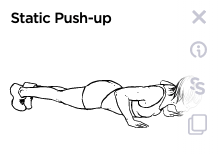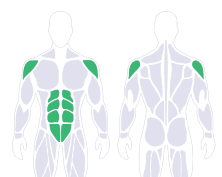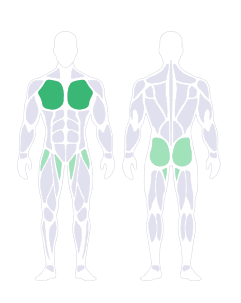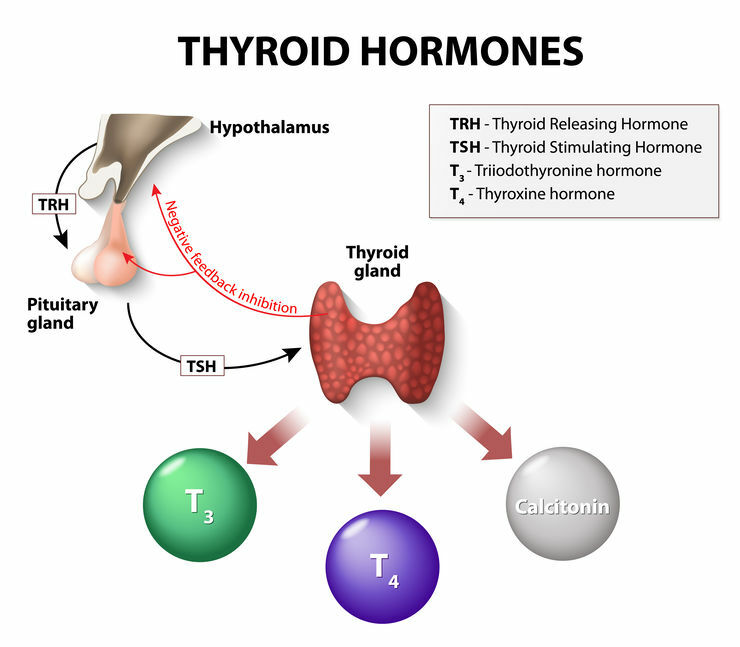
Your thyroid is a gland in the front of your neck which produces hormones which help to govern your metabolism. It is possible for your thyroid to under-produce or over-produce thyroid hormones, and both conditions can lead to debilitating symptoms. Typically an underactive thyroid leads to symptoms of lethargy, weight gain and dry skin and hair while an overactive thyroid leads to symptoms of feeling nervous and anxious, as well as weight loss. Once diagnosed, thyroid conditions can be treated but even then it is important to continue to monitor levels of thyroid hormones to ensure that your levels remain optimal.
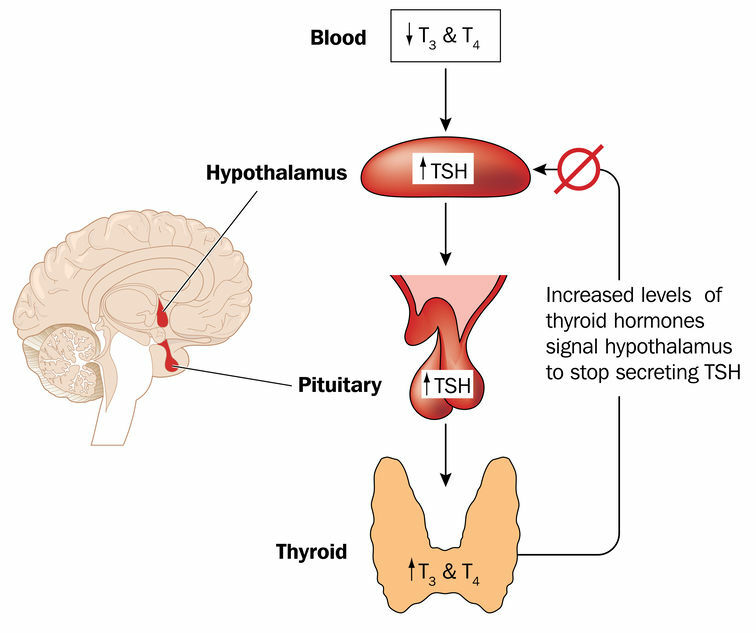
Triiodothyronine (T3)
T3 is the more active of the two thyroid hormones produced by the thyroid gland. Most T3 is bound to protein in the blood. Free T3 measures the level of T3 that is free, or unbound to protein, and is available to regulate metabolism.
What might a low result mean?
Low levels of FT3 indicate that your thyroid is not producing enough thyroid hormones which means that you may have an under-active thyroid. Symptoms of an under-active thyroid include gaining weight, feeling sensitive too cold, feeling tired, often to the point of exhaustion, and having dry skin and hair.
In some people, their T3 is low because their body has difficulty in converting T4 to T3.
What might a high result mean?
Raised levels of free T3 can indicate an overactive thyroid. This happens when your thyroid gland produces too much thyroid hormone. Symptoms of an overactive thyroid include being sensitive to heat, losing weight, having a rapid heartbeat and feeling anxious and jittery.
Some people may have high levels of free T3 if they are taking too much thyroid replacement hormone, especially if they are taking T3 (liothyronine) or a combination of T4 and T3 (e.g NDT).
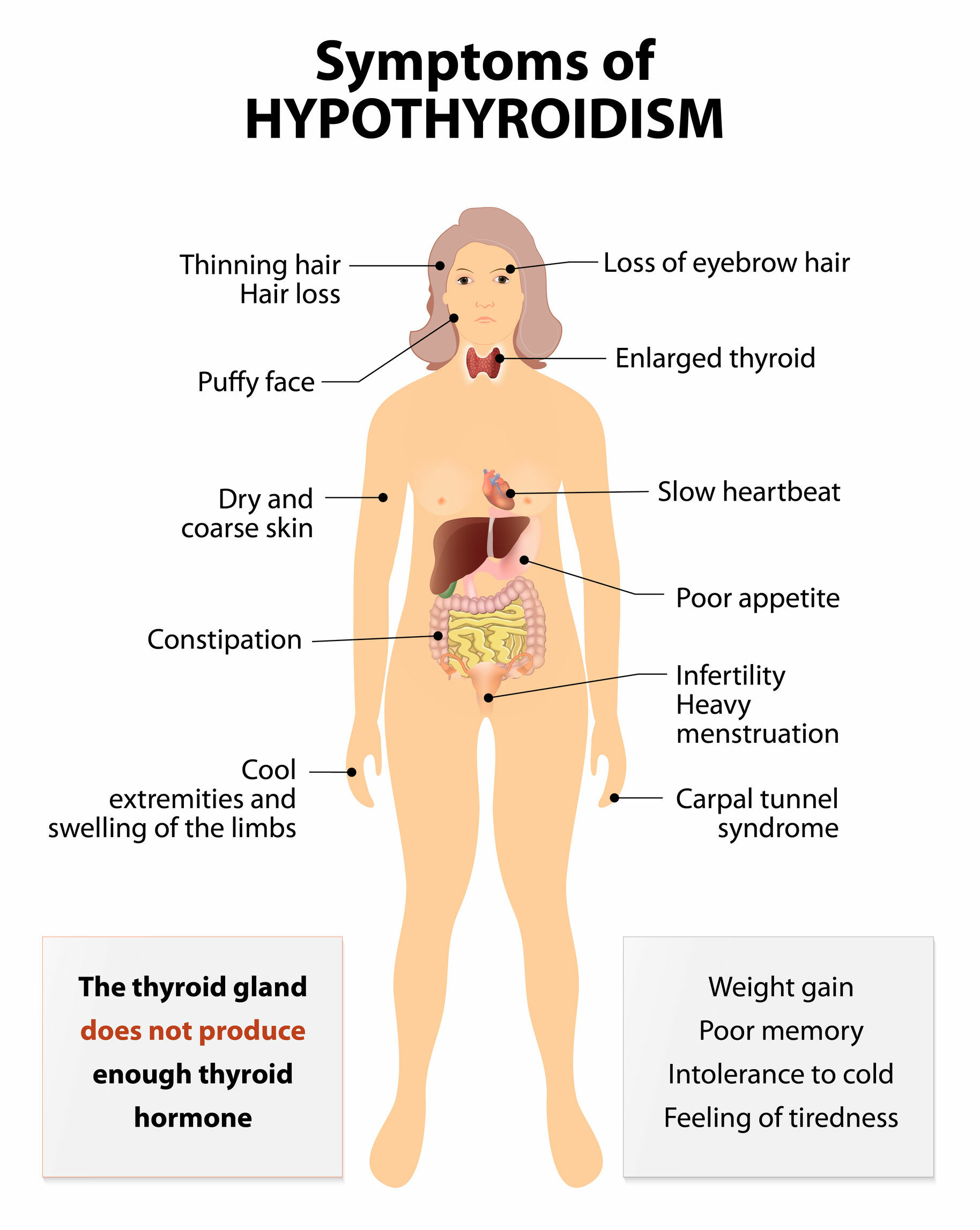
Thyroxine (T4)
T4 is one of two hormones produced by the thyroid gland. It works to speed up the rate of your metabolism. Most T4 is bound to carrier proteins in the blood - it is only the free, or unbound, T4 that is active in the body, which is measured in this test.
Free T4 is the less active of the two main thyroid hormones. To have an impact on your cells it needs to convert to the more active T3 when your body needs it.
What might a low result mean?
Low free T4 may indicate that the thyroid is under-active (hypothyroidism) and is struggling to produce enough thyroid hormones. A low FT4 result means that there is less thyroid hormone available to convert to the active T3, resulting in a slower metabolism. There are numerous symptoms of an under-active thyroid - including sensitivity to cold, gaining weight and low mood and depression.
Free T4 levels may also be slightly lower in pregnant women due to an increase in the amount of the carrier protein, thyroid binding globulin. This means that more T4 is bound, leaving less "free" to be biologically active in your cells.
What might a high result mean?
Raised free T4 can indicate an overactive thyroid. High levels of FT4 tend to lead to excess of the other thyroid hormone, T3, resulting in an overactive metabolism. Symptoms of an overactive thyroid can include sensitivity to heat, difficulty in gaining weight, a rapid heartbeat and feelings of nervous anxiety.
Sometimes raised FT4 can be seen if you have already been diagnosed with a thyroid disorder and are taking too much thyroid hormone replacement (thyroxine).
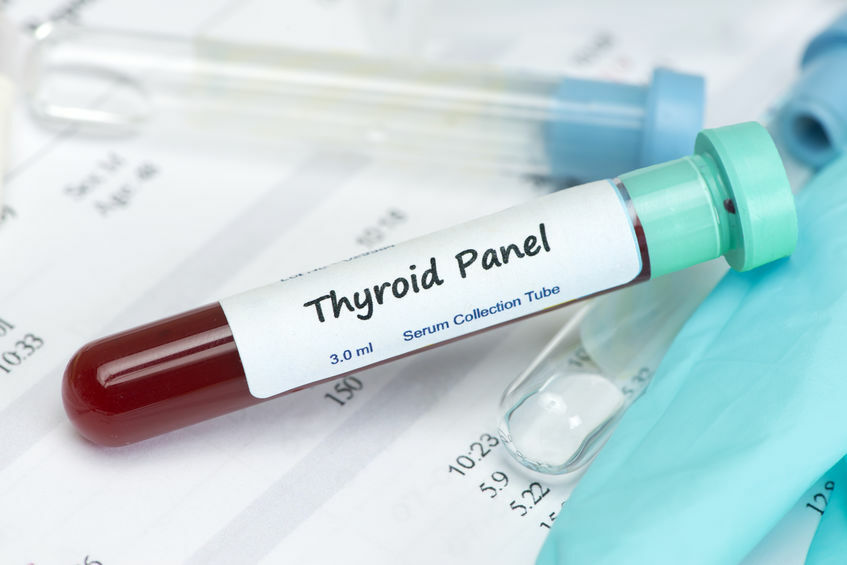
Autoimmunity (2 Biomarkers)
Autoimmunity occurs when your body's immune system mistakes your own cells or tissues as being "foreign" and starts attacking them. There are a number of autoimmune diseases which are defined by which parts of your body are under attack. Common autoimmune conditions include thyroid disease (Hashimoto's Thyroiditis and Graves' Disease), systemic lupus erythematosus (lupus) and rheumatoid arthritis. No one knows what triggers an autoimmune condition but it is well documented that more women than men are affected, and that your risk of developing an autoimmune condition is higher if a family member is affected, or if you have already been diagnosed with another autoimmune condition. Autoimmune disease can cause a wide range of symptoms which can either flare up from time to time with periods of remission, or remain present constantly. The symptoms vary according to the bodily systems affected by the disease. In some cases the tissue affected is very specific, e.g. the thyroid in Hashimoto's thyroiditis, whilst other diseases affect a wide range of body tissues, e.g. lupus.
Thyroglobulin Antibodies
This test looks for antibodies to thyroglobulin, a protein which is specific to the thyroid gland. Under normal circumstances it does not enter the bloodstream, but if your thyroid is inflamed or under attack from the body's own immune system, then thyroglobulin can be secreted and antibodies detected. Most cases of thyroid disease are caused by an autoimmune condition where the thyroid gland is attacked by the body's own immune system. This can cause the thyroid gland to produce more thyroid hormone (as in the case of Graves' disease) or to produce less as the cells in the thyroid gland are gradually destroyed (as in the case of Hashimoto's thyroiditis).
Thyroid Peroxidase Antibodies
Thyroid peroxidase is an enzyme which is produced in the thyroid gland and is important for converting T4 to the biologically active T3. This test looks for antibodies to thyroid peroxidase which indicates that the body's immune system is attacking the thyroid gland and impairing its function.
What Anti-Thyroid Antibodies Mean for You
Generally speaking, your thyroid treatment is not based on antibody levels—it is based on your symptoms and thyroid hormone levels. However, antibody tests can be useful in assessing the cause of your thyroid disease and can help identify subclinical thyroid disease.
Positive thyroid antibodies suggest that you could have autoimmune thyroid disease, but they are only a piece of the picture. (reference to study)
While they may influence the decision to move ahead with treatment, other factors in addition to your symptoms—family history, other blood test results—will be considered, too.
Anti-thyroperoxidase (TPO) Antibodies
The most common thyroid antibodies attack thyroid peroxidase. Also called thyroperoxidase (TPO), this enzyme functions in the thyroid gland to help produce the thyroid hormones thyroxine (T4) and triiodothyronine (T3).
Autoimmune antibodies can interfere with TPO's ability to use iodine to produce these hormones, resulting in hypothyroidism. TPO antibodies cause inflammation, can eventually destroy all or part of your thyroid gland, and can also cause your thyroid gland to form nodules or to become enlarged.
The presence of anti-TPO antibodies is associated with pre-term labor and with Hashimoto's thyroiditis, an autoimmune thyroid condition. (see study here)
It can take time for the destructive effect on your thyroid gland to be reflected in your thyroid-stimulating hormone (TSH) level. It's not uncommon to have positive TPO antibodies for months or years before your TSH level rises to a point where you are diagnosed with hypothyroidism. It's important to mention, as well, that some people never progress to being hypothyroid, despite having positive TPO antibodies.
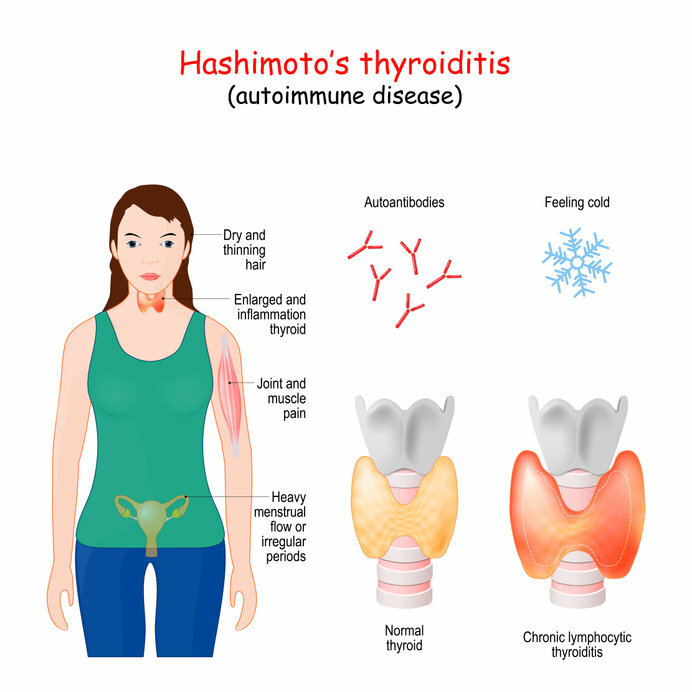
Hashimoto's disease
Hashimoto's is a condition in which your immune system attacks your thyroid, a small gland at the base of your neck below your Adam's apple. The thyroid gland is part of your endocrine system, which produces hormones that coordinate many of your body's functions.
Inflammation from Hashimoto's disease, also known as chronic lymphocytic thyroiditis, often leads to an under-active thyroid gland (hypothyroidism). Hashimoto's disease is the most common cause of hypothyroidism. It primarily affects middle-aged women but can also occur in men and women of any age and in children.
Doctors test your thyroid function to help detect Hashimoto's disease. Treatment of Hashimoto's disease with thyroid hormone replacement usually is simple and effective. Many people are claiming to improve thyroid health with changes to diet. See hundreds of people that have done that on a low-carb, Keto and carnivore way of eating here
Vanderpump MP. The epidemiology of thyroid disease. Br Med Bull. 2011;99:39-51. doi:10.1093/bmb/ldr030
Fröhlich E, Wahl R. Thyroid Autoimmunity: Role of Anti-thyroid Antibodies in Thyroid and Extra-Thyroidal Diseases. Front Immunol. 2017;8:521. doi:10.3389/fimmu.2017.00521
Additional Reading
Kotwal A, Stan M. Thyrotropin Receptor Antibodies-An Overview. Ophthalmic Plast Reconstr Surg. 2018 Jul/Aug;34(4S Suppl 1):S20-S27. doi: 10.1097/IOP.0000000000001052.
Krátký J, Ježková J, Kosák M, et al. Positive Antithyroid Antibodies and Nonsuppressed TSH Are Associated with Thyroid Cancer: A Retrospective Cross-Sectional Study. Int J Endocrinol. 2018 Sep 6;2018:9793850. doi: 10.1155/2018/9793850. eCollection 2018.

